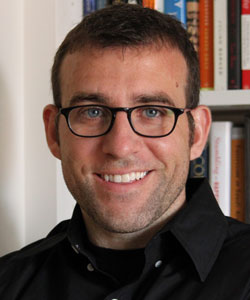Piercarlo Valdesolo
 Claremont McKenna College
Claremont McKenna College
cmcmeatlab.com
What does your research focus on?
I study the influence of discrete emotions on social and moral judgment, with a particular interest in the adaptive importance of these states. Usually this involves constructing realistic social situations in the lab meant to elicit a particular emotional state from participants, and then measuring its effects on phenomena such as trust, cooperation, altruism, blame, or punishment.
What drew you to this line of research and why is it exciting to you?
I fell into this topic serendipitously. Shortly after a distressing college breakup, I was assigned to read a series of articles authored by David Buss on the evolutionary function of jealousy for a biology class. Let’s just say the articles spoke to my experience. In fact, thinking about different theories of this emotional state turned out to be a pretty good way of dealing with its effects, and soon enough I had decided to write my senior thesis on the topic. In so doing I became fascinated with the idea that emotions, as opposed to impeding adaptive decision-making as common sense tells us, are absolutely essential for successful social living. After graduating, I entered the PhD program in social and personality psychology at Northeastern University, where I was fortunate enough to pursue this interest as a part of David DeSteno’s Social Emotions Group.
Who were/are your mentors or scientific influences?
My professors at Amherst College were the first to get me excited about the field, particularly my thesis advisor, Rose Olver, and social psychology professor, Catherine Sanderson. But my most formative and valued professional relationship is with my graduate school advisor, David DeSteno. Dave is my model for what a researcher, collaborator, teacher, and friend should be. I can’t imagine what my professional life would look like without him, though it surely would be far less successful and a lot less fun. Finally, my fantastic colleagues at Claremont McKenna College are constant reminders of the importance of perspective in the workplace. That I have not yet pulled out all my hair is a testament to their calming presence.
What’s your future research agenda?
Most of my research has focused on morality at the interpersonal level, but recently I’ve become interested in how the processes underlying moral decisions and behavior play out at the level of institutions and organizations. I hope to apply the basic science I’ve been conducting over the years to the understanding of social issues such as institutional corruption. For example, how do institutions build and lose public trust? What are the organizational structures in which individuals are likely to transgress or blow the whistle? Under what conditions are institutions perceived to be morally responsible or blameworthy entities?
What publication are you most proud of?
Valdesolo, P., & DeSteno, D. (2008). The duality of virtue: Deconstructing the moral hypocrite. Journal of Experimental Social Psychology, 44, 1334–1338.
In addition to making use of a particularly cool experimental paradigm, this study fits squarely within a now growing body of literature emphasizing our intuitive sense of equity, and arguing against intuitive self-interest.





APS regularly opens certain online articles for discussion on our website. Effective February 2021, you must be a logged-in APS member to post comments. By posting a comment, you agree to our Community Guidelines and the display of your profile information, including your name and affiliation. Any opinions, findings, conclusions, or recommendations present in article comments are those of the writers and do not necessarily reflect the views of APS or the article’s author. For more information, please see our Community Guidelines.
Please login with your APS account to comment.